🎤 Interview with Studio Shimazu
2023年 6月 27日
We had the pleasure of speaking with Studio Shimazu about working as an online Unity instructor, holding regular game jams and workshops, and making the digital and analog title, BATTING CARDGAME!
English (Translated)
Translated by Renkon
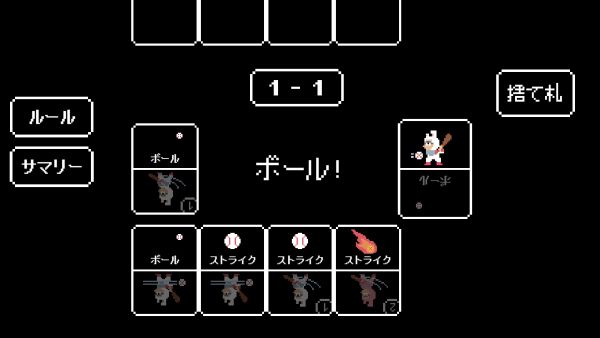
# Please tell us a little bit about yourself.
As Studio Shimazu, I am a Unity instructor who publishes YouTube videos on making games, and run a game development salon and community.
# Can you tell us about your work as an instructor? And can you tell us about the game jams that you organize?
Under the principle that “anyone in the world can create games,” I release instructional videos on YouTube and Udemy, and created the online salon Studio Shimazu to interact with students over Zoom, chat, and Discord.
We also hold game jams almost every month:
- One-week jam with a theme
- One-day jam with a theme
And so on. For each jam, we divide our salon into teams and jointly develop the games. BATTING CARDGAME was one such game that was a collaborative work made during a one-week jam.
# How did you get started making games?
When I quit my job and was unemployed, I was thinking of what I should study and found out about Unity through a site called Dot Install. When I saw this I thought, “Is it that easy to make a game?” And that was how I got started.
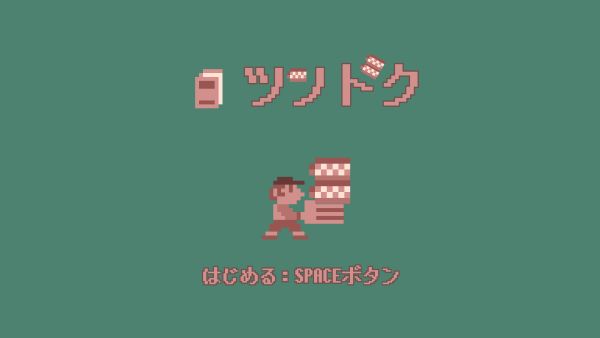
(2022) ツンドク (Piling Books)
# What does your general game-making process look like?
I just do what I feel like. (laughs)
Basically, I decide on a theme, think about the system, look for similar games, and implement additional features in accordance with the theme. However, I’m not good at coming up with interesting ideas on my own. For that reason, I recently created an online salon for board games, and invited board game makers to give lectures so that we can share our knowledge.
# What do you think is the most difficult part of making games?
Coming up with an interesting game idea is the most difficult part. I’ve learned lately that if you don’t have any ideas to draw from, there’s nothing you can do.
How many games can you say that you really know? I’ve come to realize that it’s not only important to play games, but to dig deep into their mechanics.
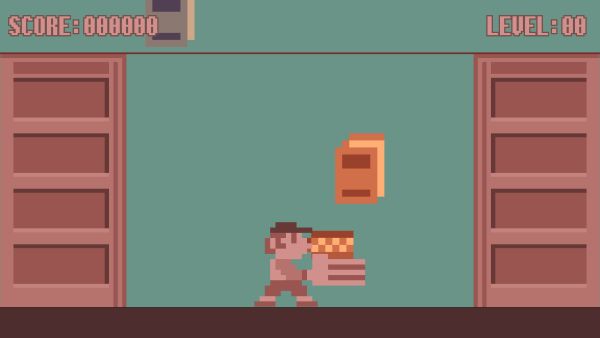
# Can you tell us about some of your favorite games and genres?
Right now I’m really into fighting games (Street Fight VI), but I still like single-player RPGs like Pokemon. I also like 2D games that don’t strain my eyes.
# I know that you are quite busy as a video game instructor, but could you tell us why you decided to create this analog game?
I thought that if I made an analog game, I could gain experience making games more easily.
The philosophy of Studio Shimazu is that “anyone in the world can create games.” I hold this belief because of the way games saved me when I quit my job and my self-esteem was crushed. I believe that making games creates connections with others, gives you something to live for, and enriches your life. However, you need to learn a lot to make digital games, and the hurdles are high. Because of that, I wanted to try an analog game.
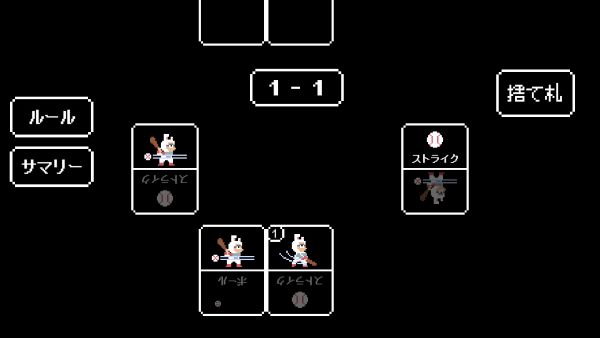
# Please tell us about BATTING CARDGAME!
It’s a two-player card game that plays out like rock-paper-scissors with a baseball theme. It’s a simple game where players take turns as the pitcher and batter, and you score points for striking out the other player. This game’s special point is that the pitcher and batter change places after each pitch.
# What was your greatest influence when making BATTING CARDGAME?
I used the card game R Rivals (ed note: released in English as BraveRats) as a reference. I referenced the E-Card game from Kaiji, and other two-player games with simple rules that required you to read your opponent.
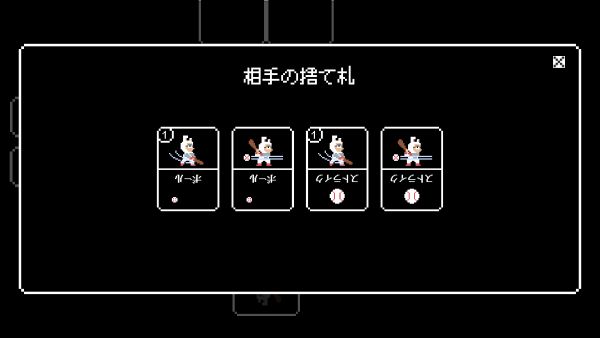
# BATTING CARDGAME is a lot of fun to play in person to try and size up what the other player is going to do. Is there a difference between how you make analog games and how you make video games?
I am currently studying how to make (and how to plan out) analog games. I don’t think there is really much of a difference with digital games, but analog games allow for more playtesting and making adjustments. And it is necessary to discuss the budget, especially by reducing the number of physical parts that we need to order. These are the main differentiating points.
With digital games, it usually takes a while before we are able to playtest between builds, so I don’t get to make too many adjustments. On the other hand, analog games can be changed on the fly and played immediately, so there are a lot more opportunities to adjust and playtest.
And the more physical parts an analog game has, the more expensive it is to manufacture. It’s interesting to come up with ways of fully expressing the game in analog form with as few pieces as possible.
# What was the most challenging part of making BATTING CARDGAME?
Turning it from a digital to an analog game. The digital version was made during a one-week game jam. I thought of the game idea, and three other members focused on making it, so it wasn’t a lot of work for me. However, when it came time to making the analog version, we had to consider things like the orientation and design of the cards. We also had limitations like only having sixteen cards per set. It was fun to think of how to solve these problems that we didn’t encounter when making the digital version.
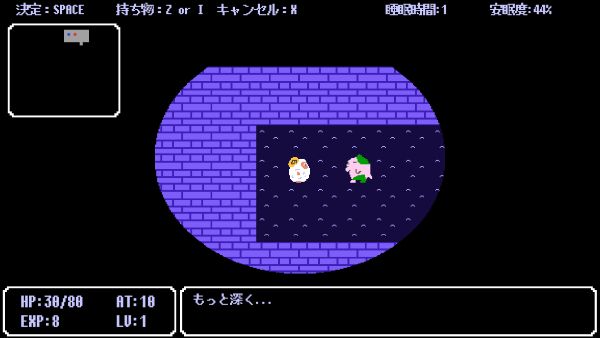
# Can you tell us about some other games you worked on in the past?
All of the games we made for our one-week game jams are on Unity Room. In particular, I am quite proud of Stray Sheep, a roguelike in the same vein as the Mysterious Dungeon series and that we made in only one week.
# Can you tell us about anything you are currently working on?
Currently, I’m thinking of making analog games. I want to release a new game at the fall Game Market, which is coming up soon.
For digital games, we are collaborating on game development at our online salon. Right now, I’m working on the programming for a 2D mystery adventure game.
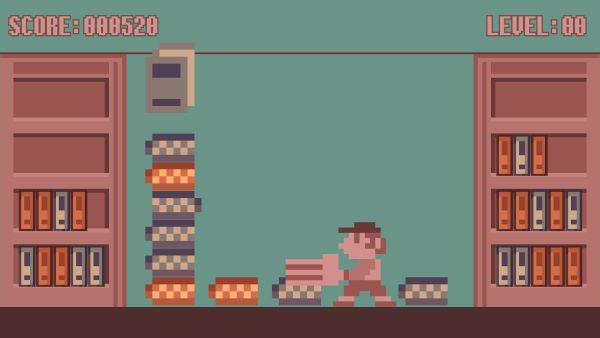
# Do you have any advice for someone who has never made a game before but would like to try?
You already have all the information you need, so it’s just a matter of getting started. If you need to make your game dev environment, a Lenovo laptop with a Core i5 or higher is about 60,000 yen. There are indie game events around Tokyo, so it’d be a good idea to check them out.
If I may plug myself, there are many people who started game development as a hobby at my online salon, so I recommend it.
This is also an advertisement, but I recommend this Udemy course because you can make and complete a game quickly. (It’s usually pretty expensive, but it goes on sale every month for 1,600 yen, so please buy it when it’s on sale.)
# Do you have any messages for your players?
I would be happy if you simply have fun while playing with your friends!
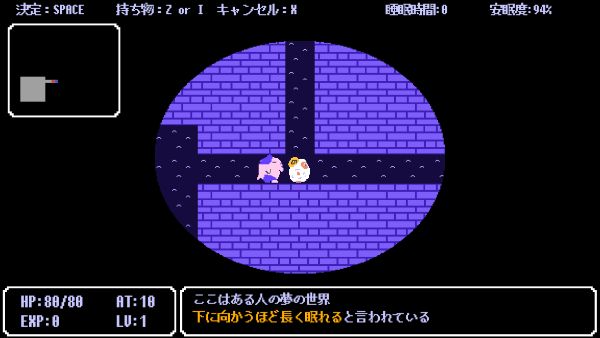
# Thank you for sharing your thoughts with us!
日本語

# 自己紹介してください。
スタジオしまづとして、ゲームの作り方をYouTubeで公開したり、オンラインサロンでゲーム開発のコミュニティを運営しているUnityインストラクターです。
# 嶋津さんのインストラクターとしての活動について紹介していただけませんでしょうか。また、ゲームジャムの主催などもされていますが、その活動についても教えてください。
「誰でもゲームが作れる世の中に」という理念でYouTubeやUdemyで動画教材を出したり、オンラインサロン(スタジオしまづ)で、Zoom対応/チャット対応/Discordで交流の場所を作ったりしています。
また、ほぼ毎月ゲームジャムを開催していて:
- 1週間でテーマに沿ったゲームを作る
- 1日でテーマに沿ったゲームを作る
などを企画しています。サロン内でチーム分けを行なって共同開発を毎回実施しています。今回の「BATTING CARDGAME」も1weekゲームジャムで共同開発したゲームです。
# ゲーム作りを始めたきっかけはなんですか。
仕事辞めて無職になった時に、何か勉強しようと思ってドットインストールというサイトでUnityを知って、その時「こんなに簡単にゲームが作れるのか」っとなったのがきっかけです。

# ゲームを作るときに、どのようなプロセスで作成されていますか。
自由に作ってます。(笑)
基本的にはテーマを決めて、システム考えて、似たゲームを探して、テーマに落とし込んで実装していくという感じです。ただ、僕自身面白いゲームを思いつくのが苦手です。そのため最近ボードゲームのオンラインサロンを作って、そこにボードゲームの講師の方を呼んで勉強しています。
# ゲーム作り全体を通して最も難しいと思うところは何ですか。
面白いゲームを思いつくのが最も難しいです。最近わかってきたのは、引き出しがないと何も出ないということです。
ゲームをどれだけたくさん知っているのか?ただ遊ぶだけじゃなくて仕組みについてどれだけ深掘りしたのかが重要だなとわかってきました。

# もしよろしければ、ご本人にとって一番好きなゲームや好きなジャンルをご紹介お願いします。
今は格ゲー(スト6)にハマってますが、ポケモンのような1人で遊べるRPGがやっぱり好きだなと思います。あと目が疲れない2Dのゲームが好みです。
# ビデオゲームのインストラクターとして大変ご活躍ですが、今回アナログゲームの作製に至った経緯などを教えていただけませんでしょうか。
アナログゲームならもっと気軽にゲームを作れる体験ができると思ったからです。
「誰でもゲームが作れる世の中に」というのがスタジオしまづの理念です。これは僕が仕事辞めたり自己肯定感が下がりまくってた時に、ゲームに救われたのが根っこにあります。ゲームを作ることで、人とのつながりが生まれたり、自身の生きがいになったり等、人生を豊かにしてくれるものだと思っています。ただ、デジタルゲームはやはり学習が必要なため、ハードルが高いのです。そこで出てきたのアナログゲームでした。

# この度の「BATTING CARDGAME」という作品についてご紹介お願いします。
2人で対戦するじゃんけんのような野球カードゲームです。ピッチャーとバッターに別れて、ストライクを打てれば得点が入るシンプルなゲームです。特徴的なのは、1球ごとにピッチャーとバッターが入れ替わることです。
# 「BATTING CARDGAME」を作成するにあたり、最も影響を受けたものは何ですか?(例えば、ほかのゲームや映画など何でも構いません)
アールライバルズというカードゲームを参考にしました。あとはカイジのEカードなど、シンプルな2人用対戦の読み合いをするカードゲームを参考にしました。

# 「BATTING CARDGAME」は、相手の顔色をうかがいながら競い合う絶妙なバランスが楽しかったです。アナログゲームとビデオゲームの作り方の違いはありますか。
作り方(企画の仕方)については今まさに勉強中です。本当はあまり違いはないと思うのですが、現状はアナログの方がテストプレイが多い(仕様変更が多い)、そして予算と相談して、少ない「もの」で工夫する、という点が大きく違う中と思います。
デジタルゲームは、ゲームをテストプレイするまで時間がかかるので、仕様変更はあまりやりたいとは思いせん。一方アナログだとすぐに変えてすぐにプレイができるので、テストプレイも仕様変更もとても多いです。 また、アナログゲームは「もの」が増えるほど、製造にお金がかかります。そのためできるだけすくな枚数/個数で表現できないかという工夫があって面白いです。
# 「BATTING CARDGAME」を作成するにあたり最も挑戦したことなどはありますか。
アナログゲームまで落とし込むことですね。デジタルの方は1weekゲームジャムという1週間で作るという企画で制作していて、僕はゲームを考えること、他のメンバー3人はゲームを作ることに専念していたので、僕自身はそれほど大変ではなかったです。ただ、アナログゲームに落とし込む際は、カードの向きだったり手札として持った時の見え方だったりが違うとか、製造できるカードの枚数が1セット16枚以内という制限があるところなど、デジタルでは起こらない問題を解決するのが非常に面白かったです。

# もしよろしければ、これ以外に作成したゲームについてご紹介お願いします。
1weekゲームジャムで作ったゲームは基本的にここにあります。特に「Stray Sheep」という不思議のダンジョンのようなローグライクゲームは自分でも1週間頑張ったなと思えるゲームになったと思います。
# 今はどのようなプロジェクトを進めていますか。今作っているゲームなどをもしよろしければご紹介お願いします。
現在は自分の考えているゲームはアナログゲームが中心です。秋のゲームマーケットで新作を出したいと思っているので、近日公開という感じです。
デジタルについては、オンラインサロンで共同開発しています。今はストーリーも楽しめるような2Dの謎解きアドベンチャーを考えてもらって、僕がプログラムをしています。

# ゲームを作ったことがないけどこれから作ってみたいという人へ何かアドバイスはありますか。
今は情報が揃っているので、やるかやらないかだけです。環境的にもCorei5以上のノートPCがレノボで6万円ぐらいで変えます。東京周辺であればインディーゲームのイベントなどもあるので一度見学してみるといいかもしれません。
自分で言うのもなんですが、オンラインサロンでは趣味としてゲーム開発を始めた人がたくさんいるので、おすすめです。こちらも宣伝になりますが、この講座とかサクッと作れるのでおすすめです。(通常は高いので毎月あるセール時1600円程度で買ってください。)
# プレイヤーの皆さんへ何かメッセージがあれば一言お願いします。
シンプルに友達と通話しながら、ワイワイ遊んでもらえると嬉しいです!

# この度はインタビューにご協力いただき誠にありがとうございます。

